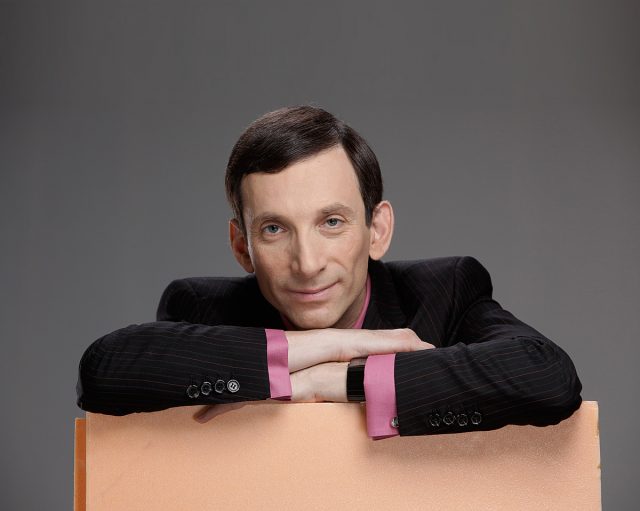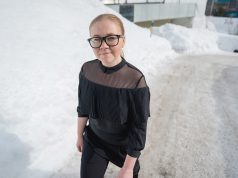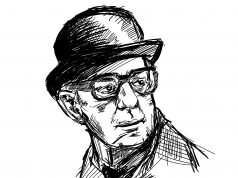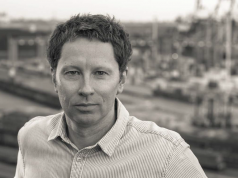For twenty five years Vitaly Portnikov has been one of Ukraine’s leading journalists and political commentators. Born in Kyiv in 1967, Portnikov soon moved to Moscow to study at the Moscow University Faculty of Journalism. After a stint as a parliamentary correspondent covering Russia he became truly well known throughout the post-Soviet world for his adventurous dispatches from every corner of the former Soviet empire. A list of the newspapers, magazines, radio and television stations that he has worked for or contributed to would likely take up the rest of the space allotment for this article. Such a list would also bore the reader, which is something that the impish and very funny Portnikov would never approve of. This year he was nominated for the prestigious Taras Shevchenko Award for his essay collection “Mother of God in the Synagogue”.
Portnikov is very well known for both his strident Ukrainian patriotism and his outspoken Zionism. During the Maidan protests, Portnikov emerged as a passionate spokesman for Ukrainian Jewry and Ukrainian independence.
On a chilly Sunday afternoon in Kyiv Portnikov met with The Odessa Review’s Chief Editor Vladislav Davidzon to discuss his views on the place of Jewish Ukrainians in the new Ukraine.
Odessa Review (Vladislav Davidzon): Three years after Maidan, your well known March 2014 article shows that Ukrainian Jews are now completely integrated into Ukrainian society, that Maidan has changed everything and that Ukrainian Jews’ participation in Maidan proves they are Ukrainians just like everyone else.
Vitaly Portnikov (VP): Yes, I wrote that. And I do not think that this was such a surprising discovery. I have argued for many years that the real consequence of the proclamation of the Ukrainian state would be the emergence of a modern Ukrainian political nation. The only question was when it was going to happen.
OR: And that process happened on February 22, 2014 [the day that the Maidan revolution ended with President Victor Yanukovich fleeing].
VP: Generally speaking, it happened on February 22, 2014, but it is not that simple. The Ukrainian political nation emerged not only as a result of Maidan. It emerged as a result of both the Maidan and the annexation of the Crimea by Russia and the war in the Donbas. There were different circumstances which led to different regions of Ukraine becoming part of the Ukrainian political nation and, of course, national minorities becoming part of this Ukrainian political nation.
And this process is not complete, by the way. As we speak, there is a serious discussion going on about the language of teaching in schools for national minorities: Romanian, Hungarian, Polish. We also observe that, on the one hand, the representatives of these national minorities are ready to become part of the Ukrainian political nation, and, on the other, they want their language to remain a part of their daily life. They want their children to study at universities in Hungary or Romania, not in Ukraine. They do not want to lose the prerequisite language skills that would allow their children to study there. That is why I say that we are witnessing a process that will not be over in one day, not in a month, and not even in one or ten years.
I would say that the process of forming the Ukrainian political nation has launched in earnest. Because until 2013/2014, the Ukrainian project was an ethnic one. Not because of the Ukrainians themselves, but rather because of the national states Ukrainian lands had became part of. For the Ukrainians could only survive and de- fend themselves within the framework of the ethnic project. That didn’t change in 1991, because the state that emerged here was undoubtedly just a renamed Ukrainian Soviet state. Its values, including cultural and civilizational ones, remained largely Soviet. This meant that the Russian political environment continued to prevail in the beginning, and then the Russian cultural environment prevailed too. Even today, some of the mass media is closer to people, and often it is in the Russian language. And in this sense, those who wanted Ukraine to be Ukrainian continued to operate within that same ethnic project. And people who were of a different ethnic origin had difficulties participating in this ethnic project, even if they wanted to. Often they did not want to, though.
OR: It is difficult in this situation, and the Jews did not have the same demands, expectations as the [ethnic] Hungarians, Romanians, Poles, etc.
VP: I think that’s not the point. In this context, we should not generally speak about Jews because Jewish Ukrainian history is completed. The line was drawn a long time ago. Jews in Ukraine do not represent any community. They are rather a monument, a reminder of the Jewish community, the Jewish culture that once existed. And in general, we can only talk about the kind of culture this community has been. But not about today. That would be a speculation in which I do not participate. For this is not just a matter of the number of Jews, but also the quality of Jewish cultural life. And here we can say that this civilization just did not exist for a long time, that it vanished.
And that does not come as a surprise. There are different reasons for that. The first and most powerful, the most serious one is the Holocaust. Because the Holocaust destroyed this community [and] the cultural tradition that still existed in a certain way even after the [1917-1921] Civil War. The main destroyer was, of course, the civil war and the surrounding events. But after the Holocaust, there were still some cultural lighthouses remaining, but they were destroyed by the Soviet regime in 1950, when the last of the Jewish culture was destroyed. Writers, poets, and cultural figures were killed, and the Yiddish language was actually forbidden. And when, decades later, everything had been resolved, no one came back. Then the Aliyah began, and that didn’t really end until the 90’s. And again, I must say that it was not the Jews who left the country, but mostly Soviets of Jewish origin who could have become Ukrainian Jews if they had stayed here. There would have been enough of them to rebuild the community. But that did not happen.
OR: But again, extrapolating from this moment, there is no real Ukrainian-Jewish history?
VP: There was, but before [Bohdan] Khmelnytsky’s uprising. You can look it up. That is history. It can be investigated, one can try to understand the difference between this history and the history of the Jews of the Crown and the Grand Duchy of Lithuania.
This is precisely the story one needs to know in order to realize that it ended there. And we realize that we, those Jews of Ukraine, are often people with Polish first names and Yiddish surnames, but we are quite different people from those before us. My grandmother, on my mother’s side, she was a Dashevskaya. That comes from Dashev in Galicia. My grandfather was a Bromberg. This name is associated with the city of Bydgoszcz, which is now in Poland. There was a large community there. My great-grandmother on my mother’s side was a Satanovskaya, this comes from Sataniv in Podillia. I could name many more of these surnames.
OR: So you are saying that you are Polish Jews, not Ukrainian Jews?
VP: All Jews are like that, there are no others. And Portnikov is a surname of Belarusian origin — Belarusian-Jewish origin, it is simply Russified. But this name is linked to the distorted name of a profession that could have existed somewhere in the Vitebsk region. This also gives proof of the roots. Have no doubts or illusions on this account. And it is a very good question, why so many Jews of Ukraine basically have all these Polish names associated with Polish or Galician cities. But there are no surnames associated with Ukrainian ethnonyms, very few such surnames, they are very rare.
OR: I understand from your position that you are a Ukrainian patriot and even represent a revival of a new Jewish-Ukrainian political nation inside Ukraine.
VP: Well, to continue the story, I only wanted to say that, in the twentieth century, the conditions for the emergence of our own Ukrainian Jewry had matured, which, however, I repeat, were interrupted. They were interrupted in various ways. My grandmothers went to Jewish schools, which later became Ukrainian. Their younger sisters, who died in the Holocaust, went to the first class of the Ukrainian school. And they were already different children.
Just for the sake of understanding: In my aunt’s diaries — my grandmother’s sister, who died in the war — there are dialogues between her and her parents. These dialogues are in Russian, but I understand that this is a translation from Yiddish. And dialogues with one younger sister are written in Ukrainian, they are not translated. Because she talked to this girl in Ukrainian. And the girl spoke Yiddish with her parents. Theoretically, other children, other generations and a different cultural and political community could have existed in the Soviet Union, but there was the Holocaust. Why are we now discussing something that did not happen? In May 1945 — let’s just call it what it is — European Jewry perished. Not just the Ukrainian, but also the Jewry of Europe as a civilizational stratum ceased to exist forever.
OR: By the way, speaking about this, I recently read the newly published posthumous memoirs of Shimon Peres, which came out a week ago, and he describes a tragic scene, where after the war the delegates in Switzerland at the Basel Zionist Congress left the seats of European delegates empty as sign of respect and half of the room was empty. There was no one there. There were just a few people in the middle of the room where European Jews were supposed to be sitting.
VP: Yes, that’s right. There were certainly Jews here. These Jews who were here, quite a few actually, they were silent Jews. It was still a fairly large group of people who were subjected to cultural and political pressure throughout the Soviet Union, so that they all lost memories of their roots, their culture and everything else. We recollect very well what remained at the beginning of the reconstruction of Jewish culture in the Soviet Union: the magazine in Yiddish, the language which only a few could read, the Amateur theater in Kalmas, the amateur music ensemble in Vilnius, the ensemble “Freilekhs”, “The Birobidzhan Philharmonic” and that is all. Everything. There was nothing in Ukraine. I remember very well that the ensemble “Freilekhs”, whose musical director was my uncle Vladimir Portnikov, was the first musical ensemble outside Lithuania since 1945, when Jewish theaters and others [ensembles] were banned. And there was also a Jewish musical theater in Moscow in the recent years, it was allowed in the late 1980’s. It was called “Shalom”, if I am not mistaken.
OR: So, did the Maidan not change anything?
VP: Why did it not change anything? I did not say that. This should be addressed. Of course, recent events might change all this to a certain extent, although people are already separated from their roots, from their communal roots. They could come to Israel, to Zionism, to understand the need to live in a Jewish state. But Ukrainian Jewry has almost disappeared. Even the little that existed. And there were some individuals who hardly felt like part of the Ukrainian political organism due to the absence of the latter. It came with Maidan, this political organism, and indeed many people felt like a part of it, people of Jewish origin. That’s what happened on the Maidan. That did not happen during the Maidan in 2004, for example.
OR: This is important, this is an important difference.
VP: It is a very important difference, that one of the participants of the Maidan 2004, Yevgeny Chervonenko, the former head of Yushchenko’s guards, an ethnic Jew, who later became Minister, still does not understand what happened in 2014. He became an active fighter for the Russian world, speaking Russian in Ukraine, etc., because, as in 2004, he supported the presidency and was part of the power structure, he did not feel as if he was part of the Ukrainian political nation. Now, this is a very good example. Many people of Jewish origin, who were on the Maidan in 2014, felt themselves to be part of this Ukrainian political organism. That is why Josef Zissels could perform on the Maidan, while there were portraits of Bandera.
OR: Speaking of Stepan Bandera’s portraits what does his presence now mean for Ukrainian-Jewish thought? For Ukrainian-Jewish self-identification? In the middle of the war or in the middle of a difficult situation, where the Ukrainian nation shapes itself, decommunization happens — we have to do decide wether we even want to touch on the questions of Bandera. Do Ukrainian Jews have any responsibility to avoid these issues?
VP: I do not think that Ukrainian Jews shouldn’t bring up these issues. I think they should first understand these issues themselves: what actually happened, what separates them from the Ukrainians in this story and what connects them. Because the idea of “do not touch” is not right, and the idea “we understand” is right. That is, if we look at this era through the eyes of contemporaries and the eyes of the winners [ed: Soviet winners of that conflict], which is very important. Very often we look with the eyes of Soviet winners who did not want to see the Soviet-Nazi pact of 1939-1941 and do not want to think about how the Jews felt between 1939 and 1941 when Hitler collaborated with Stalin. When Maxim Litvinov was dismissed from his post as Foreign Minister of the Soviet Union because of his Jewish background. How could that happen? I’ll tell you how! People did not believe. They ceased to believe in the old Soviet propaganda, which said Hitler would destroy Jews. So my relatives died in Kamenka in the Cherkasy region and did not go into evacuation, although they had the opportunity. Many Jews did not have that opportunity. But they did and they didn’t go. Because they believed the newspapers that wrote about prosperity when there was the Holodomor… therefore I’ll repeat myself again: we have to deal with the history together with the Ukrainians. We are not the only factor here. Everyone should understand this history. Ukrainians, Jews, Poles.
OR: In the past three years, these two nations who have lived together on this territory for more than 1000 years, have they learned something about each other?
VP: I believe that the Jews have seen that Ukraine exists as a political nation, and Ukrainians have seen that Jews could be part of this nation. This is probably the most important thing. Now, when we talk about two peoples who have been living here for 1000 years, I remind you that the Ukrainian people actually live here and that the Jewish people don’t live here anymore. The Jewish people live in Israel and there is a great community in America, of course. From the perspective of the American Jews there is also a people there, from the point of view of the Israelis there are no people, only communities. These are two different views on development. I believe that each of these views is legitimate. But I am not ready to say that the European Jews somehow form a civilization…
OR: So you think think that European Jews no longer exist?
VP: Right, European Jews no longer exist, and Ukraine is Europe.
OR: But if you add all the Jews who live in England, in France, not counting the citizens of the Russian Federation, there could be a million of them, all together.
VP: Yes, but most of them are not members of community life. With the European political nations that were established after the Second World War, the Jews who lived in Europe became French, English and here they will become Ukrainians. That is an important point. There will be an obvious disengagement in the future. People will go to Israel, and I have always tried to do everything possible for the Ukrainian Jews to go to Israel, and I have never made a secret of that. I have always said that I have three political goals. I had them in the 1990’s, I have them now: the collapse of the Soviet empire; the independence of Ukraine; the free return of the Jews. For me, these are inseparable concepts. I just want to participate in the Ukrainian state project.
OR: As a Ukrainian Jew?
VP: As a Ukrainian Jew, as a Zionist, as a person, being a Zionist, who understands the national aspiration of Ukrainians. But at the same time, if I meet a young Jew and he asks me what he should do, I answer that if he feels Ukrainian, he should work for Ukraine. But if you identify primarily as a Jew and that is more valuable to you, do not delude yourself, go to Israel. And when I hear someone say: “I want to work here, and just enjoy myself in Israel”, to me this person has a certain internal crisis.
OR: So you see Russian Jews and Ukrainian Jews, in this context as being two communities that are inevitably going to grow in different directions?
VP: Yes, and then there is again the question of whether there are communities or whether there are citizens of Jewish origin, who today are connected with states in one way or another. And here it is again necessary to speak separately about the Russian Jews. There are Russian Jews who, like real citizens of their country, do not accept the behavior of the Russian political regime, that understand that the actions of Putin’s regime, also concerning Ukraine, will lead the country to a dead end. And they remember their Ukrainian roots, because basically there are no Russian Jews. There are people from Ukraine, Belarus and Lithuania who were at certain times in Moscow, St. Petersburg and other civilizational centers. And they understand that Putin’s attack on Ukraine is also an attack on their own family memory.
And there are certain communities that have very few members as well, because there are very few Jews in Russia, but they are institutions. And these institutions cooperate with the authorities and support the largely offensive and anti-Semitic policies of this government. The policy of the Putin regime is not only criminal with regard to Ukraine, it is criminal with regard to the Jewish people. Putin’s actions in Syria, his support for extremist organizations that threaten the existence of the state of Israel are openly anti-Semitic politics. It seems to me that, today, we can talk about the leadership of the Russian-Jewish communities as collaborators, whom I have already compared to those Jews who served as police in the Hitler ghetto. I only perceive these people as people who have lost all the foundations of morality. My Jewish origin does not let me speak conciliatory about them. Even more, it forces me to give a more severe account of them than of the people of Russian ethnicity who just accept these policies.
OR: That is terrible. On the other hand, you must also be indulgent with them, knowing they are not part of a democratic society, that they are essentially hostages.
VP: They are not hostages. They were hostages in the 1950’s, when they could not leave the Soviet Union. The doors of the Russian Federation are open now. And if you want to remain a Jew and a decent person, you must pack your suitcase and go to the State of Israel.




































